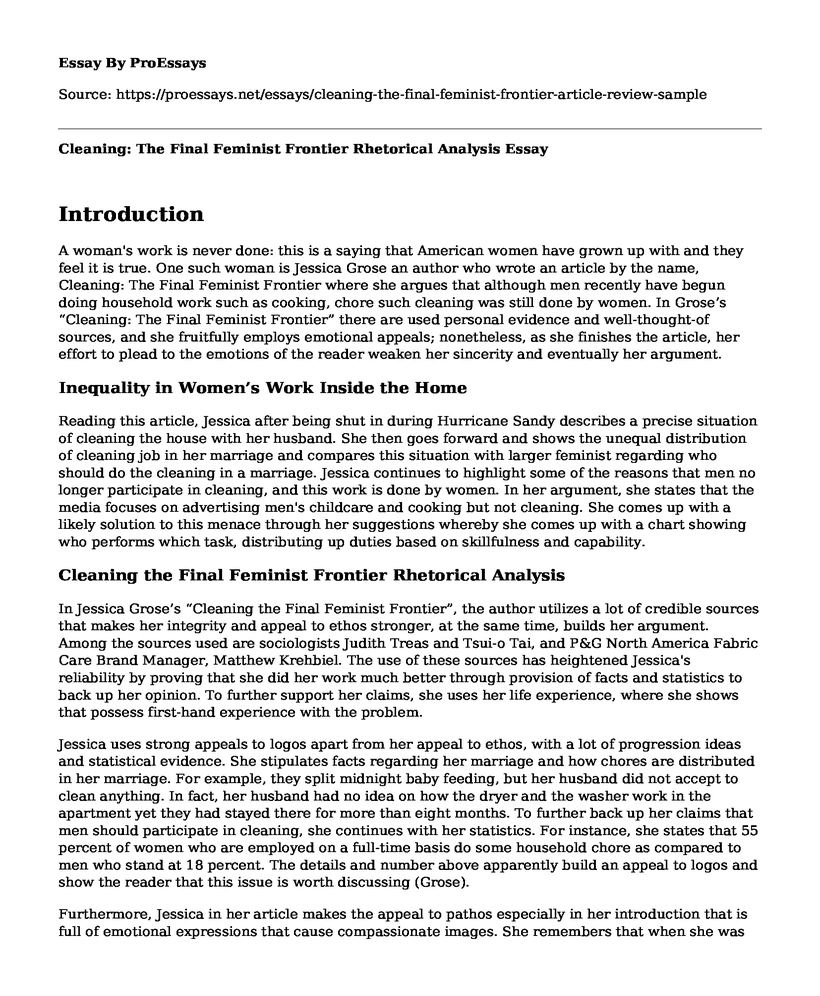Introduction
A woman's work is never done: this is a saying that American women have grown up with and they feel it is true. One such woman is Jessica Grose an author who wrote an article by the name, Cleaning: The Final Feminist Frontier where she argues that although men recently have begun doing household work such as cooking, chore such cleaning was still done by women. In Grose’s “Cleaning: The Final Feminist Frontier” there are used personal evidence and well-thought-of sources, and she fruitfully employs emotional appeals; nonetheless, as she finishes the article, her effort to plead to the emotions of the reader weaken her sincerity and eventually her argument.
Inequality in Women’s Work Inside the Home
Reading this article, Jessica after being shut in during Hurricane Sandy describes a precise situation of cleaning the house with her husband. She then goes forward and shows the unequal distribution of cleaning job in her marriage and compares this situation with larger feminist regarding who should do the cleaning in a marriage. Jessica continues to highlight some of the reasons that men no longer participate in cleaning, and this work is done by women. In her argument, she states that the media focuses on advertising men's childcare and cooking but not cleaning. She comes up with a likely solution to this menace through her suggestions whereby she comes up with a chart showing who performs which task, distributing up duties based on skillfulness and capability.
Cleaning the Final Feminist Frontier Rhetorical Analysis
In Jessica Grose’s “Cleaning the Final Feminist Frontier”, the author utilizes a lot of credible sources that makes her integrity and appeal to ethos stronger, at the same time, builds her argument. Among the sources used are sociologists Judith Treas and Tsui-o Tai, and P&G North America Fabric Care Brand Manager, Matthew Krehbiel. The use of these sources has heightened Jessica's reliability by proving that she did her work much better through provision of facts and statistics to back up her opinion. To further support her claims, she uses her life experience, where she shows that possess first-hand experience with the problem.
Jessica uses strong appeals to logos apart from her appeal to ethos, with a lot of progression ideas and statistical evidence. She stipulates facts regarding her marriage and how chores are distributed in her marriage. For example, they split midnight baby feeding, but her husband did not accept to clean anything. In fact, her husband had no idea on how the dryer and the washer work in the apartment yet they had stayed there for more than eight months. To further back up her claims that men should participate in cleaning, she continues with her statistics. For instance, she states that 55 percent of women who are employed on a full-time basis do some household chore as compared to men who stand at 18 percent. The details and number above apparently build an appeal to logos and show the reader that this issue is worth discussing (Grose).
Furthermore, Jessica in her article makes the appeal to pathos especially in her introduction that is full of emotional expressions that cause compassionate images. She remembers that when she was eight months pregnant, her husband could not bear with her. The author is trying to portray the difficulties she went through when she was pregnant, and this efficiently provides the argument more serious. Hence Jessica's opinion was to make the reader sympathize with her.
But as the article comes to an end, the appeal it had in ethos at the beginning and in the middle becomes less active. For example, the author asserts that men will be regarded as passing small cases of gender bravery. Also, as she concludes her article, Jessica in her last statement weakens her argument by referring to her husband. In her conclusion when she returns to the introductions hook, a strategy that is commonly used, the author humorously decides to return to her husband. She talks about solutions and states that ‘there is a huge, untapped market ... for toilet-scrubbing iPods. I bet my husband would buy one.’ This is an appeal to ethos or personal trustworthiness when she returns to her marriage and precisely her husband, and even though this worked for her while introducing the article, it fails while concluding the article. In conclusion, the strategy does not have the seriousness and strength that she wanted the topic to have and while the article was being introduced.
Cleaning the Final Feminist Frontier Summary
Conclusively, the author successfully begins her article and persuades her reader on the inequality that is being experienced in our household when it comes to distribution of house chores. She claims that men participate in taking care of children and cooking but are not involved in cleaning. However, at the end, Jessica loses her power, where she is required to adequately drive her argument. The reader is able to identify the existence of the problem in her marriage and in the society at large, but, at the end, she shifts to humor and sarcasm, something that makes the reader not to take the problem seriously (Grose).
Work Cited
Grose, Jessica. Cleaning: The Final Feminist Frontier. New Republic. The New Republic, 19 Mar. 2013. Web. 28 Mar. 2014.
Cite this page
Cleaning: The Final Feminist Frontier Rhetorical Analysis. (2021, Apr 07). Retrieved from https://proessays.net/essays/cleaning-the-final-feminist-frontier-article-review-sample
If you are the original author of this essay and no longer wish to have it published on the ProEssays website, please click below to request its removal:
- The September 11 Terrorist Attacks in the US: The Implications
- The Social Order in Grenada - Essay Esample
- Internal and External Communication Initiatives Essay
- Research Paper on How People Understand Feminism in the Society
- Technology's Impact on Global Human Relations Paper Example
- Theme of Women and Communication in 'Handmaid's Tale' by Margaret Atwood
- Essay Example on Racism in Sports: Discrimination Against Black Players







